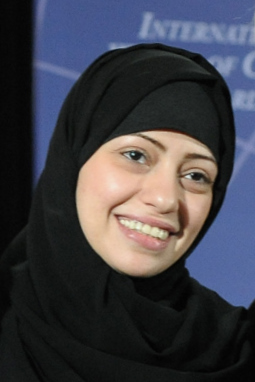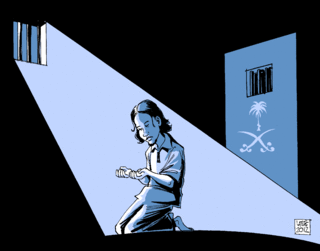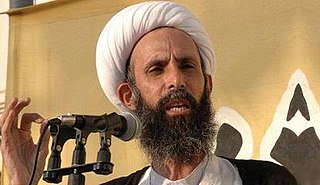
The Kingdom of Saudi Arabia is an Islamic absolute monarchy in which Sunni Islam is the official state religion based on firm Sharia law. Non-Muslims must practice their religion in private and are vulnerable to discrimination and arrest. While no law requires all citizens to be Muslim, non-Muslim foreigners attempting to acquire Saudi Arabian nationality must convert to Islam. Children born to Muslim fathers are by law deemed Muslim.

Human rights in Saudi Arabia are a topic of concern and controversy. Known for its executions of political protesters and opponents, the government of the Kingdom of Saudi Arabia has been accused of and denounced by various international organizations and governments for violating human rights within the country. An absolute monarchy under the House of Saud, the government is consistently ranked among the "worst of the worst" in Freedom House's annual survey of political and civil rights and was in 2023 ranked as the world's most authoritarian regime.
Political repression of cyber-dissidents is the oppression or persecution of people for expressing their political views on the Internet.

The mass media in Malaysia includes television, radio, newspapers, and web-based media such as bloggers. Many media outlets are either owned directly by the government of Malaysia or owned by component parties of the Barisan Nasional coalition which continuously form the government during Mahathir Mohamad's tenure until May 2018. Opposition parties during this era like the Islamic Party and People's Justice Party publish their own newspapers, Harakah and Suara Keadilan respectively, which are openly sold alongside regular publications.
Censorship is a long term issue in Malaysia which has become more apparent as it attempts to adapt to a modern knowledge-based economy. Despite having in its Federal Constitution that subject to certain conditions, "every citizen has the right to freedom of speech and expression", Malaysia has consistently sat low on global indexes related to press and media freedom.

Saudi Arabia's laws are an amalgam of rules from Sharia, royal decrees, royal ordinances, other royal codes and bylaws, fatwas from the Council of Senior Scholars and custom and practice.
Since the launch of Twitter on July 15, 2006, there have been many notable uses for the service in a variety of environments, including political, economic, social and cultural uses. As users tweet their messages on Twitter, they encourage other people to respond and engage in online discussions as well as offline activities. User engagement on Twitter is usually measured with likes, replies and retweets and is a form of social power.

Until June 2018, Saudi Arabia was the only country in the world in which women were forbidden from driving motor vehicles. The Women to Drive Movement was a campaign by Saudi women, whom the government denies many rights to which men are entitled, for the right to drive motor vehicles on public roads. Dozens of women drove in Riyadh in 1990 and were arrested and had their passports confiscated. In 2007, Wajeha al-Huwaider and other women petitioned King Abdullah for the right to drive, and a film of al-Huwaider driving on International Women's Day 2008 attracted international media attention.

Samar bint Muhammad Badawi is a Saudi Arabian human rights activist. She and her father filed court cases against each other in Saudi Arabia. Badawi's father accused her of disobedience under the Saudi Arabian male guardianship system and she charged her father with adhl—"making it hard or impossible for a person, especially a woman, to have what she wants, or what's rightfully hers; e.g, her right to marry" according to Islamic jurisprudence—for refusing to allow her to marry. After Badawi missed several trial dates relating to the charge, an arrest warrant was issued for her, and Badawi was imprisoned on 4 April 2010. In July 2010, Jeddah General Court ruled in Samar Badawi's favor, and she was released on 25 October 2010, and her guardianship was transferred to an uncle. There had been a local and international support campaign for her release. The Saudi NGO Human Rights First Society described Badawi's imprisonment as "outrageous illegal detention".

Hamza Kashgari Mohamad Najeeb is a Saudi poet and a former columnist for the Saudi daily newspaper Al-Bilad. In 2011, he was on a Mabahith watchlist of pro-democracy activists.

Ayatollah Sheikh Nimr Baqir al-Nimr, commonly referred to as Sheikh Nimr, was a Shia sheikh from Al-Awamiyah in Saudi Arabia's Eastern Province. His arrest and execution were widely condemned by various governments and human rights organizations.
Sayed Zabiuddin Ansaria.k.a.Abu Hamza or Abu Jundal is an Indian Islamic militant belonging to Indian Mujahideen and Lashkar-e-Taiba. He is accused of being involved in 2008 Mumbai attacks. Zabiuddin Ansari 's name was listed in the list of "50 most wanted criminals sheltered in Pakistan" released by India on 21 May 2011. He served as the handler of the 10 LeT terrorists during 2008 Mumbai attacks.
Dissidents have been detained as political prisoners in Saudi Arabia during the 1990s, 2000s, 2010s, 2020s and earlier. Protests and sit-ins calling for political prisoners to be released took place during the 2011–2012 Saudi Arabian protests in many cities throughout Saudi Arabia, with security forces firing live bullets in the air on 19 August 2012 at a protest at al-Ha'ir Prison. As of 2012, recent estimates of the number of political prisoners in Mabahith prisons range from a denial of any political prisoners at all by the Ministry of Interior, to 30,000 by the UK-based Islamic Human Rights Commission and the BBC.

Waleed Sami Abulkhair is a Saudi Arabian lawyer and human rights activist, and the head of the Monitor of Human Rights in Saudi Arabia (MHRSA) organization. He is the first activist to be prosecuted by the Terrorism Law. He was arrested on 15 April 2014, and was sent to al-Ha'ir Prison while awaiting prosecution. On 6 July 2014, Abulkhair was sentenced to 15 years in prison by the Specialized Criminal Court, and a travel ban for another 15 years, in addition to a fine of 200,000 riyals (US$53,333). On 12 January 2015, the case returned to the Court of Appeals, after which the judge requested increasing the previous sentence, because Abulkhair refused to apologize. Thus, the judgment was tightened to 15-year executed. In response, Abulkhair prayed for God's victory and refused to recognize the legitimacy of the Specialized Criminal Court. Abulkhair is incarcerated in the Dhahban Central Prison in Jeddah, Saudi Arabia, a facility used to hold high-profile political prisoners, as well as members of al-Qaeda and the Islamic State.

Habib Muhammad Rizieq bin Hussein Shihab is an Indonesian Islamist cleric, the founder and leader of the Islamist group Islamic Defenders Front, which was banned by the government in December 2020. Facing criminal charges in Indonesia, he lived in Riyadh, Saudi Arabia from 2017 to November 2020. Following his return to Indonesia, he was arrested in late 2020, accused of criminal incitement for holding crowded events that violated the COVID-19 pandemic regulations.
N. Surendran s/o K. Nagarajan, commonly referred to as N. Surendran, is a Malaysian lawyer and politician who served as the Member of Parliament (MP) for Padang Serai from May 2013 to May 2018. He is an independent. He was a member and Vice President of the People's Justice Party (PKR), a component party of the Pakatan Harapan (PH) and formerly Pakatan Rakyat (PR) coalitions.
Mohammed Junaid Thorne is an Australian Islamic preacher of Aboriginal heritage from Perth, Western Australia. Thorne is noted for his controversial views on Islamic militant groups including Islamic State of Iraq and the Levant. Thorne is a member of the Australian branch of Millatu Ibrahim, a Salafi organisation banned in Germany. In August 2015 Thorne was sentenced to between four and eight months jail for travelling on an aircraft under a false name, and using fake ID to obtain his ticket.
Racism in Saudi Arabia extends to allegations of imprisonment, physical abuse, rape, murder, overwork, and wage theft, especially of foreign workers who are given little protections under the law.
Rahaf Mohammed is a Saudi author who was detained by Thai authorities on 5 January 2019 while in transit through an airport in Bangkok, en route from Kuwait to Australia.
The following lists events in the year 2019 in Saudi Arabia.









